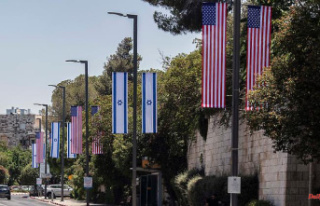At a public hearing on the storming of the US Congress, witnesses report how blindly they followed ex-President Trump. Finally, there is a conciliatory gesture between an ex-militia officer and the police officer.
When witness Stephen Ayres takes the floor in the congressional committee to explain why he marched to the Capitol on January 6, it becomes clear how it came to this on January 6, 2021. The "family man" from the state of Ohio, who likes to play basketball with his child, was a Trump supporter: "I followed him on every possible website." Ayres "definitely believed" there was fraud in the presidential election. And when the 45th President wrote to come to the anti-election theft event, he knew he had to be there.
The seventh meeting of the committee of inquiry once again made clear Trump's determination and demonstrated how calculated his actions were. The introduction of the hearing had taken an unusually long time, after two hours and fifteen minutes it was the turn of the witnesses. This session also showed that a former television man is shaping it. The hearings are like a nightly US television show, where the presenter reads his text from the teleprompter and is only interrupted by selected interview excerpts that support his argument.
Like the first witness Stephen Ayres, many others probably felt the same way on January 6th. Trump's speech in Washington D.C. brought before his followers, he says. "We followed what he told us. I think everyone thought he'll go with us. He said in his speech he'll be with us. I believed him."
Ayres is not wrong: Trump wanted to run to the Capitol with his followers, a former White House aide Cassidy Hutchinson testified in a previous hearing. Accordingly, the Secret Service could only dissuade him from his project with difficulty. The draft of a tweet from Trump, which the committee shows, is intended to prove this. It was never published, but the President approved it.
Trump knew the power of tweets from his fingers, so the slow stirring up of supporters must have been calculated. "Come on, it's getting wild," he tweeted in December about his January 6 speech. Trump's followers with a lot of reach on their social network channels fueled this because they potentiated what their president wrote. One of them asked, "Why don't we just kill them?" That was Nancy Pelosi, the leader of the Democrats in the House of Representatives.
The Jan. 6 escalation came even as Trump's advisers, from family to his ministers, said there was no evidence of voter fraud. The committee plays a statement from former White House Counsel Pat Cipollone. "There is no way to contest the election," he said, adding another voice urging the president to accept his election defeat. He couldn't.
"We have to be glad that the number of dead - as tragic as everything was - was not even greater on January 6th, the potential was there, you can see that in the pictures," said the second witness present, Jason van Tatenhove former spokesman for the radical right-wing movement Oath Keepers. He told the committee that he was worried about what would happen after the next election. He doesn't name Trump, but it's clear who it's about: "If a president is willing to foment a civil war with lies and deceit among his supporters, (...) what will he do if he is re-elected? "
After the last session, Donald Trump reportedly called a witness, but the witness didn't answer the phone, says committee vice chair Liz Cheney. The case is now with the Justice Department and, according to Cheney, shows the means by which Trump is working.
The session ends with a conciliatory gesture. After the committee chair concludes the session, Ohio family man Stephen Ayres walks over to the police officers protecting Congress on January 6th. Four of them are in the hearing room. Ayres apologizes to them, hugging each one in turn. Antonio Gonell, who can no longer work as a police officer because of his permanent injuries, was then asked by journalists how he took the apology. "It is what it is," he says. "But that's not how I wanted to retire."












